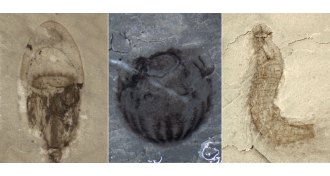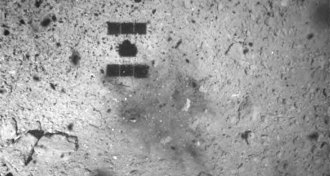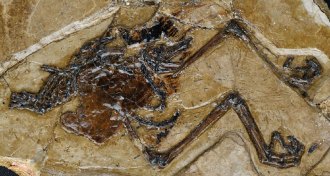All Stories
-
 Particle Physics
Particle PhysicsHow a proton gets its spin is surprisingly complicated
Pinning down the source of protons’ spin is surprisingly hard to do.
-
 Paleontology
PaleontologySaber-toothed cats were fierce and family-oriented
New details shift the debate on whether Smilodon lived and hunted in packs, and answer questions about other behaviors and abilities.
-
 Neuroscience
NeuroscienceWomen have a new weapon against postpartum depression, but it’s costly
The newly approved drug brexanolone simulates a natural hormone to alleviate symptoms of postpartum depression.
By Jeremy Rehm -
 Health & Medicine
Health & MedicineU.S. fentanyl deaths are rising fastest among African-Americans
New statistics on fentanyl-related overdoses show troubling increases in deaths among African-Americans, Hispanics and men.
-
 Archaeology
ArchaeologyThe oldest known astrolabe was used on one of Vasco da Gama’s ships
A navigational device for taking altitudes at sea was found in a Portuguese shipwreck in the Arabian Sea and dates back to 1496.
By Bruce Bower -
 Paleontology
PaleontologyNewfound fossils in China highlight a dizzying diversity of Cambrian life
A new treasure trove of Cambrian fossils in China dating to 518 million years ago could rival Canada’s Burgess Shale.
-
 Health & Medicine
Health & MedicineSaving monkey testicle tissue before puberty hints at a new way to preserve fertility
Frozen testicle tissue samples from prepubescent monkeys transplanted back onto those monkeys once they matured produced sperm.
-
 Health & Medicine
Health & MedicineA new ketamine-based antidepressant raises hope — and questions
Little is known about the long-term effects on people of a newly approved antidepressant based on the anesthetic ketamine.
-
 Planetary Science
Planetary ScienceRyugu is probably a chip off one of these two other asteroids
Japan’s Hayabusa2 team has narrowed down the asteroid Ryugu’s origins based on its color.
-
 Astronomy
AstronomyX-ray ‘chimneys’ connect the Milky Way to mysterious gamma-ray bubbles
Two columns of X-rays that are hundreds of light-years long could explain the existence of giant bubbles of energetic light that sandwich the galaxy.
-
 Paleontology
PaleontologyIn a first, a fossilized egg is found preserved inside an ancient bird
Scientists have found the first known fossil of a bird that died with an unlaid egg inside its body. The egg has been crushed by pressure over time.
-
 Planetary Science
Planetary ScienceSurprising astronomers, Bennu spits plumes of dust into space
Bennu spews dust from its rocky surface, which may be a new kind of asteroid activity.